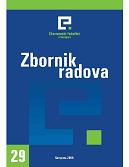Komparativni prikaz pravne regulative elektronskog ugovaranja: Evropska unija i Sjedinjene Američke Države
Regulating e-Contract Formation: Comparing the European Union and the United States of America
Author(s): Fatima Mahmutćahajić, Vedad Silajdžić, Veljko TrivunSubject(s): Law, Constitution, Jurisprudence
Published by: Ekonomski fakultet u Sarajevu
Keywords: e-Commerce; e-Contract; internet; legal regulation
Summary/Abstract: The main reason for regulating electronic contract formation in both the European Union and the United States of America is to create a secure legal environment. This paper presents a brief review of how e-Commerce is regulated in both the European Union and the United States of America in order to draw out differences between them in certain areas and the potential for conflict between the laws governing this form of business. European Union directives establish specific common rules to ensure that businesses and individuals can avail of goods and services via the information society within the European Union, unaffected by national borders. The United States of America, however, prefers an approach based on self-regulation determined by economic interests to the imposition of rules regulating how the e-Market should develop and be used. Contracting parties are free to choose which form or standard of e-signature to use. In the European Union, only an advanced and/or qualified electronic signature, guaranteed by a recognized certification provider, is considered to meet the legal requirements in the same way as a handwritten signature in the appropriate written format. This paper starts from the assumption that similarities and partial convergence exist in the legal regulation of contract formation by electronic means. The universal nature of business conducted in cyber-space requires that differences in the legal regulation be removed to ensure that everyone involved enjoys the same rights and obligations. Signing the Stabilization and Association Agreement meant that Bosnia and Herzegovina agreed to bring its legal regulations into line with the rules in the aquis communitaire.
Journal: Zbornik radova Ekonomskog fakulteta u Sarajevu
- Issue Year: 2009
- Issue No: 29
- Page Range: 465-476
- Page Count: 12
- Language: Bosnian

